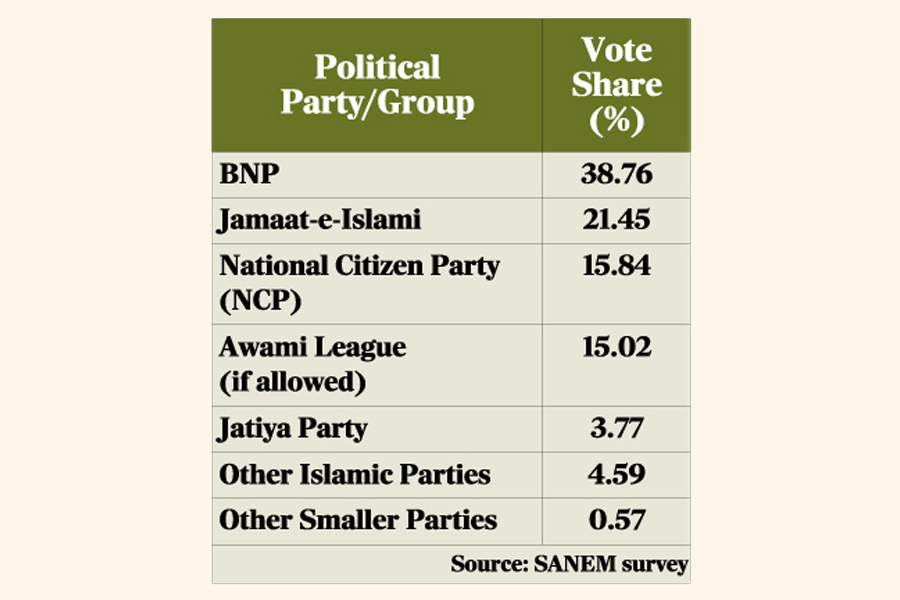
Published :
Updated :

Bangladeshi youths anticipate that the BNP will secure the largest share of votes in the upcoming 13th national elections, while Jamaat-e-Islami expected to come in second, according to a nationwide survey conducted by the South Asian Network on Economic Modeling (SANEM).
The survey showed that 38.76 per cent of respondents expect the BNP to win, followed by Jamaat-e-Islami with 21.45 per cent.
The National Citizen Party (NCP), formed after last year's mass uprising that ousted the Awami League government, was projected to receive 15.84 per cent of votes, while other Islamist parties were expected to garner 4.59 per cent.
These findings were presented at a roundtable titled "Youth in Transition: Navigating Jobs, Education, and Changing Political Scenario Post July Movement" held at the BRAC Centre Inn in Dhaka on Monday.
Though smaller individually, the combined vote share of Jamaat, NCP, and other Islamist parties suggests that an electoral alliance among them-currently a major topic of political discussion-could present a significant challenge to the BNP.
Interestingly, despite being barred from contesting, the Awami League was still projected to secure 15.02 per cent of the vote.
Meanwhile, the Jatiya Party was expected to receive 3.77 per cent, with other smaller political entities garnering just 0.57 per cent.
The survey also explored youth expectations regarding the election. Around 40.89 per cent of respondents said they were moderately optimistic about a free and fair election, while 27.91 per cent were very optimistic, and 11.93 per cent fully optimistic.
In contrast, 13.23 per cent were slightly optimistic, and 6.04 per cent expressed no optimism at all.
Regarding voting intentions, 76.78 per cent of the youth surveyed said they planned to vote, while 4.14 per cent did not intend to participate. Another 5.09 per cent were undecided, and 13.98 per cent were not eligible to vote.
Beyond politics, the survey highlighted pressing economic challenges.
Nearly 39 per cent of youth reported being neither employed nor actively seeking jobs or entrepreneurial opportunities, pointing to a growing segment of inactive youth.
By comparison, 47.3 per cent were employed either full- or part-time, while 13.7 per cent were unemployed but actively looking for work. Of those employed, 75.7 per cent worked in the service sector.
Only 14.54 per cent of respondents felt their education had adequately prepared them for employment, and just 11.68 per cent had received any job training in the past year. Government jobs remained the most preferred career choice, followed by entrepreneurship.
The survey also revealed significant frustrations among job seekers, with 28.66 per cent having searched for employment for more than two years.
Nepotism emerged as the biggest barrier to employment, cited by 54.72 per cent of respondents, followed by lack of formal education and scarcity of jobs.
Interest in migration was high, with around 40 per cent considering moving abroad; however, most, especially women, said they would prefer to remain in Bangladesh if better opportunities were available.
Also, limited digital literacy and awareness were identified as obstacles to participation in the gig economy.
Political disengagement among youth was evident-half of respondents felt political parties were disconnected from real youth issues, and 82.7 per cent expressed disinterest in politics.
Nevertheless, 94 per cent demanded urgent reforms in education, followed by healthcare, labour rights, and human rights.
Dr Selim Raihan, executive director of SANEM, chaired the discussion, while Farah Kabir, country director of ActionAid Bangladesh, attended as the special guest.
sajibur@gmail.com


 For all latest news, follow The Financial Express Google News channel.
For all latest news, follow The Financial Express Google News channel.